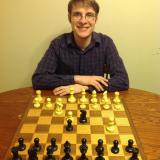Richard started learning chess when he was 10. Within months of his first introduction to the game, he joined his grade school chess club and began winning games against much more experienced scholastic players. That same year, Richard entered his first two tournaments—both of them against adults—after which he competed regularly in adult and scholastic tournaments. From 5th through 12th grade, he served as the captain of his school chess team. Afterwards, he served as president of the Knox College Chess Club from 2007-2008.
Richard trained with IM Josh Manion, a former Wisconsin State Scholastic Champion, from 1998-2000, and with GM Gregory Kaidanov, a former US Open Champion, from 2000-2002.
Between 1996 and 2005, Richard accumulated 68 tournament trophies and medals (more than half of them first place finishes), an Illinois State Junior High Championship in 2001, Denker Invitationals in 2001 and 2002, and a tie for first in the National Grade School Championship (with none other than GM Hikaru Nakumura, then only a master) in 1998—only 16 months after Richard’s first tournament! He also placed 12th in the National High School Championships in 2002.
Richard recently became a National Chess Master in October of 2014. He tied for first in the Waukesha Memorial Open 2014, tied for second in the Indianapolis Open 2014, and defeated Awonder Liang, the child prodigy from Wisconsin. His particular chess strengths lie in tactics, calculation depth, endgames, and speed, but he is a well-rounded player with deep knowledge of all parts of the game. His current USCF rating is 2201. He also earned his lifetime Candidate Master title from the USCF in June 2014.
Richard began teaching chess in January 2010. Since then, he has taught after school programs, summer camps, private lessons, and group lessons. He also frequently shows up to his students’ tournaments to give encouragement and go over games with them. As a teacher, he creates individualized lessons and focuses on keeping his students engaged, helping them recognize patterns, and addressing every student with respect.

